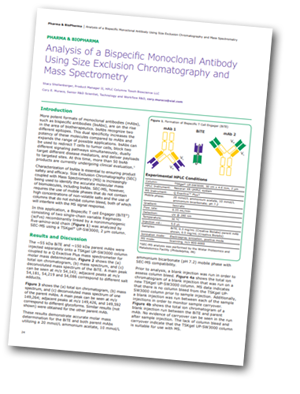Looking for an effective method for monoclonal antibody analysis? SEC-MS could be the answer...
 More potent formats of monoclonal antibodies (mAbs), such as bispecific antibodies (bsAbs), are on the rise in the area of biotherapeutics. bsAbs recognize two different epitopes. This dual specificity increases the potency of these molecules compared to mAbs and expands the range of possible applications. bsAbs can be used to redirect T cells to tumor cells, block two different signaling pathways simultaneously, dually target different disease mediators, and deliver payloads to targeted sites. At this time, more than 50 bsAb products are currently undergoing clinical evaluation.
More potent formats of monoclonal antibodies (mAbs), such as bispecific antibodies (bsAbs), are on the rise in the area of biotherapeutics. bsAbs recognize two different epitopes. This dual specificity increases the potency of these molecules compared to mAbs and expands the range of possible applications. bsAbs can be used to redirect T cells to tumor cells, block two different signaling pathways simultaneously, dually target different disease mediators, and deliver payloads to targeted sites. At this time, more than 50 bsAb products are currently undergoing clinical evaluation.
Characterization of bsAbs is essential to ensuring product safety and efficacy. Size Exclusion Chromatography (SEC) coupled with Mass Spectrometry (MS) is increasingly being used to identify the accurate molecular mass of biomolecules, including bsAbs. SEC-MS, however, requires the use of mobile phases that do not contain high concentrations of non-volatile salts and the use of columns that do not exhibit column bleed, both of which will interfere with the MS signal response.
In this article, a Bispecific T cell Engager (BiTE®) consisting of two single-chain variable fragments (scFvs) recombinantly linked by a nonimmunogenic five-amino-acid chain was analysed by SEC-MS using a TSKgel® UP-SW3000, 2 μm column.
